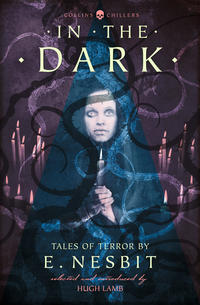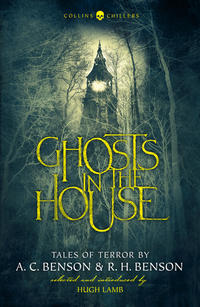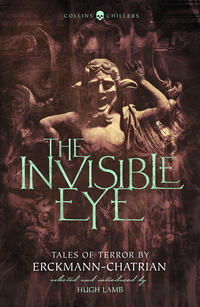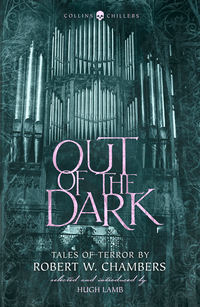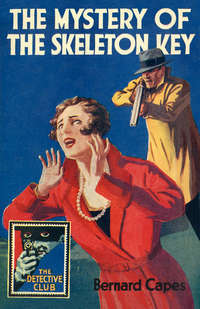
Полная версия
Out of the Dark: Tales of Terror by Robert W. Chambers
I was dumbfounded. Who had placed it there? How came it in my rooms? I had long ago decided that I should never open that book, and nothing on earth could have persuaded me to buy it. Fearful lest curiosity might tempt me to open it, I had never even looked at it in book-stores. If I ever had any curiosity to read it, the awful tragedy of young Castaigne, whom I knew, prevented me from exploring its wicked pages. I had always refused to listen to any description of it, and indeed, nobody ever ventured to discuss the second part aloud, so I had absolutely no knowledge of what those leaves might reveal. I stared at the poisonous mottled binding as I would at a snake.
‘Don’t touch it, Tessie,’ I said; ‘come down.’
Of course my admonition was enough to arouse her curiosity, and before I could prevent it she took the book and, laughing, danced off into the studio with it. I called to her but she slipped away with a tormenting smile at my helpless hands, and I followed her with some impatience.
‘Tessie!’ I cried, entering the library, ‘listen, I am serious. Put that book away. I do not wish you to open it!’ The library was empty. I went into both drawing-rooms, then into the bedrooms, laundry, kitchen, and finally returned to the library and began a systematic search. She had hidden herself so well that it was half an hour later when I discovered her crouching white and silent by the latticed window in the store-room above. At the first glance I saw she had been punished for her foolishness. ‘The King in Yellow’ lay at her feet, but the book was open at the second part. I looked at Tessie and saw it was too late. She had opened ‘The King in Yellow’. Then I took her by the hand and led her into the studio. She seemed dazed, and when I told her to lie down on the sofa she obeyed me without a word. After a while she closed her eyes and her breathing became regular and deep, but I could not determine whether or not she slept. For a long while I sat silently beside her, but she neither stirred nor spoke, and at last I rose and entering the unused store-room took the book in my least injured hand. It seemed heavy as lead, but I carried it into the studio again, and sitting down on the rug beside the sofa, opened it and read it through from beginning to end.
When, faint with the excess of my emotions, I dropped the volume and leaned wearily back against the sofa, Tessie opened her eyes and looked at me.
We had been speaking for some time in a dull monotonous strain before I realized that we were discussing ‘The King in Yellow’. Oh the sin of writing such words – words which are clear as crystal, limpid and musical as bubbling springs, words which sparkle and glow like the poisoned diamonds of the Medicis! Oh the wickedness, the hopeless damnation of a soul who could fascinate and paralyze human creatures with such words – words understood by the ignorant and wise alike, words which are more precious than jewels, more soothing than music, more awful than death!
We talked on, unmindful of the gathering shadows, and she was begging me to throw away the clasp of black onyx quaintly inlaid with what we now knew to be the Yellow Sign. I shall never know why I refused, though even at this hour, here in my bedroom as I write this confession, I should be glad to know what it was that prevented me from tearing the Yellow Sign from my breast and casting it into the fire. I am sure I wished to do so, and yet Tessie pleaded with me in vain. Night fell and hours dragged on, but still we murmured to each other of the King and the Pallid Mask, and midnight sounded from the misty spires in the fog-wrapped city. We spoke of Hastur and of Cassilda, while outside the fog rolled against the blank window-panes as the cloud waves roll and break on the shores of Hali.
The house was very silent now and not a sound came up from the misty streets. Tessie lay among the cushions, her face a gray blot in the gloom, but her hands were clasped in mine and I knew that she knew and read my thoughts as I read hers, for we had understood the mystery of the Hyades, and the Phantom of Truth was laid. Then as we answered each other, swiftly, silently, thought on thought, the shadows stirred in the gloom about us, and far in the distant streets we heard a sound. Nearer and nearer it came, the dull crunching of wheels, nearer and yet nearer, and now, outside before the door it ceased, and I dragged myself to the window and saw a black-plumed hearse. The gate below opened and shut, and I crept shaking to my door and bolted it, but I knew no bolts, no locks, could keep that creature out who was coming for the Yellow Sign. And now I heard him moving very softly along the hall. Now he was at the door, and the bolts rotted at his touch. Now he had entered. With eyes starting from my head I peered into the darkness, but when he came into the room I did not see him. It was only when I felt him envelop me in his cold soft grasp that I cried out and struggled with deadly fury, but my hands were useless and he tore the onyx clasp from my coat and struck me full in the face. Then, as I fell, I heard Tessie’s soft cry and her spirit fled: and even while falling I longed to follow her, for I knew that the King in Yellow had opened his tattered mantle and there was only God to cry to now.
I could tell more, but I cannot see what help it will be to the world. As for me I am past human help or hope. As I lie here, writing, careless even whether or not I die before I finish, I can see the doctor gathering up his powders and phials with a vague gesture to the good priest beside me, which I understand.
They will be very curious to know the tragedy – they of the outside world who write books and print millions of newspapers, but I shall write no more, and the father confessor will seal my last words with the seal of sanctity when his holy office is done. They of the outside world may send their creatures into wrecked homes and death-smitten firesides, and their newspapers will batten on blood and tears, but with me their spies must halt before the confessional. They know that Tessie is dead and that I am dying. They know how the people in the house, aroused by an infernal scream, rushed into my room and found one living and two dead, but they do not know what I shall tell them now; they do not know that the doctor said as he pointed to a horrible decomposed heap on the floor – the livid corpse of the watchman from the church: ‘I have no theory, no explanation. That man must have been dead for months!’
I think I am dying. I wish the priest would—
A PLEASANT EVENING
‘Et pis, doucett’ment on s’endort
On fait sa carne, on fait sa sorgue,
On ronfle, et, comme un tuyau d’orgue
L’tuyau s’met à ronfler plus fort …’
ARISTIDE BRUANT
I
As I stepped upon the platform of a Broadway cable-car at Forty-second Street, somebody said, ‘Hello, Hilton, Jamison’s looking for you.’
‘Hello, Curtis,’ I replied, ‘what does Jamison want?’
‘He wants to know what you’ve been doing all the week,’ said Curtis, hanging desperately to the railing as the car lurched forward; ‘he says you seem to think that the Manhattan Illustrated Weekly was created for the sole purpose of providing salary and vacations for you.’
‘The shifty old tom-cat!’ I said indignantly, ‘he knows well enough where I’ve been. Vacation! Does he think the State Camp in June is a snap?’
‘Oh,’ said Curtis, ‘you’ve been to Peekskill?’
‘I should say so,’ I replied, my wrath rising as I thought of my assignment.
‘Hot?’ inquired Curtis, dreamily.
‘One hundred and three in the shade,’ I answered. ‘Jamison wanted three full pages and three half pages, all for process work, and a lot of line drawings into the bargain. I could have faked them – I wish I had. I was fool enough to hustle and break my neck to get some honest drawings, and that’s the thanks I get!’
‘Did you have a camera?’
‘No. I will next time – I’ll waste no more conscientious work on Jamison,’ I said sulkily.
‘It doesn’t pay,’ said Curtis. ‘When I have military work assigned to me, I don’t do the dashing sketch-artist act, you bet; I go to my studio, light my pipe, pull out a lot of old Illustrated London News, select several suitable battle scenes by Caton Woodville – and use ’em too.’
The car shot round the neck-breaking curve at Fourteenth Street.
‘Yes,’ continued Curtis, as the car stopped in front of the Morton House for a moment, then plunged forward again amid a furious clanging of gongs, ‘it doesn’t pay to do decent work for the fat-headed men who run the Manhattan Illustrated. They don’t appreciate it.’
‘I think the public does,’ I said, ‘but I’m sure Jamison doesn’t. It would serve him right if I did what most of you fellows do – take a lot of Caton Woodville’s and Thulstrup’s drawings, change the uniforms, “chic” a figure or two, and turn in a drawing labelled “from life”. I’m sick of this sort of thing anyway. Almost every day this week I’ve been chasing myself over that tropical camp, or galloping in the wake of those batteries. I’ve got a full page of the “camp by moonlight”, full pages of “artillery drill” and “light battery in action”, and a dozen smaller drawings that cost me more groans and perspiration than Jamison ever knew in all his lymphatic life!’
‘Jamison’s got wheels,’ said Curtis, ‘—more wheels than there are bicycles in Harlem. He wants you to do a full page by Saturday.’
‘A what?’ I exclaimed, aghast.
‘Yes he does – he was going to send Jim Crawford, but Jim expects to go to California for the winter fair, and you’ve got to do it.’
‘What is it?’ I demanded savagely.
‘The animals in Central Park,’ chuckled Curtis.
I was furious. The animals! Indeed! I’d show Jamison that I was entitled to some consideration! This was Thursday; that gave me a day and a half to finish a full-page drawing for the paper, and, after my work at the State Camp I felt that I was entitled to a little rest. Anyway I objected to the subject. I intended to tell Jamison so – I intended to tell him firmly. However, many of the things that we often intended to tell Jamison were never told. He was a peculiar man, fat-faced, thin-lipped, gentle-voiced, mild-mannered, and soft in his movements as a pussy cat. Just why our firmness should give way when we were actually in his presence, I have never quite been able to determine. He said very little – so did we, although we often entered his presence with other intentions.
The truth was that the Manhattan Illustrated Weekly was the best paying, best illustrated paper in America, and we young fellows were not anxious to be cast adrift. Jamison’s knowledge of art was probably as extensive as the knowledge of any ‘Art editor’ in the city. Of course that was saying nothing, but the fact merited careful consideration on our part, and we gave it much consideration.
This time, however, I decided to let Jamison know that drawings are not produced by the yard, and that I was neither a floor-walker nor a hand-me-down. I would stand up for my rights; I’d tell old Jamison a few things to set the wheels under his silk hat spinning, and if he attempted any of his pussy-cat ways on me, I’d give him a few plain facts that would curl what hair he had left.
Glowing with a splendid indignation, I jumped off the car at the City Hall, followed by Curtis, and a few minutes later entered the office of the Manhattan Illustrated News.
‘Mr Jamison would like to see you, sir,’ said one of the compositors as I passed into the long hallway. I threw my drawings on the table and passed a handkerchief over my forehead.
‘Mr Jamison would like to see you, sir,’ said a small freckle-faced boy with a smudge of ink on his nose.
‘I know it,’ I said, and started to remove my gloves.
‘Mr Jamison would like to see you, sir,’ said a lank messenger who was carrying a bundle of proofs to the floor below.
‘The deuce take Jamison,’ I said to myself. I started toward the dark passage that leads to the abode of Jamison, running over in my mind the neat and sarcastic speech which I had been composing during the last ten minutes.
Jamison looked up and nodded softly as I entered the room. I forgot my speech.
‘Mr Hilton,’ he said, ‘we want a full page of the Zoo before it is removed to Bronx Park. Saturday afternoon at three o’clock the drawing must be in the engraver’s hands. Did you have a pleasant week in camp?’
‘It was hot,’ I muttered, furious to find that I could not remember my little speech.
‘The weather,’ said Jamison, with soft courtesy, ‘is oppressive everywhere. Are your drawings in, Mr Hilton?’
‘Yes. It was infernally hot and I worked like the devil—’
‘I suppose you were quite overcome. Is that why you took a two days’ trip to the Catskills? I trust the mountain air restored you – but – was it prudent to go to Cranston’s for the cotillion Tuesday? Dancing in such uncomfortable weather is really unwise. Good-morning, Mr Hilton, remember the engraver should have your drawings on Saturday by three.’
I walked out, half hypnotized, half enraged. Curtis grinned at me as I passed – I could have boxed his ears.
‘Why the mischief should I lose my tongue whenever that old tom-cat purrs!’ I asked myself as I entered the elevator and was shot down to the first floor. ‘I’ll not put up with this sort of thing much longer – how in the name of all that’s foxy did he know that I went to the mountains? I suppose he thinks I’m lazy because I don’t wish to be boiled to death. How did he know about the dance at Cranston’s? Old cat!’
The roar and turmoil of machinery and busy men filled my ears as I crossed the avenue and turned into the City Hall Park.
From the staff on the tower the flag drooped in the warm sunshine with scarcely a breeze to lift its crimson bars. Overhead stretched a splendid cloudless sky, deep, deep blue, thrilling, scintillating in the gemmed rays of the sun.
Pigeons wheeled and circled about the roof of the gray Post Office or dropped out of the blue above to flutter around the fountain in the square.
On the steps of the City Hall the unlovely politician lounged, exploring his heavy underjaw with wooden toothpick, twisting his drooping black moustache, or distributing tobacco juice over marble steps and close-clipped grass.
My eyes wandered from these human vermin to the calm scornful face of Nathan Hale, on his pedestal, and then to the gray-coated Park policeman whose occupation was to keep little children from the cool grass.
A young man with thin hands and blue circles under his eyes was slumbering on a bench by the fountain, and the policeman walked over to him and struck him on the soles of his shoes with a short club.
The young man rose mechanically, stared about, dazed by the sun, shivered, and limped away. I saw him sit down on the steps of the white marble building, and I went over and spoke to him. He neither looked at me, nor did he notice the coin I offered.
‘You’re sick,’ I said, ‘you had better go to the hospital.’
‘Where?’ he asked vacantly. ‘I’ve been, but they wouldn’t receive me.’
He stooped and tied the bit of string that held what remained of his shoe to his foot.
‘You are French,’ I said.
‘Yes.’
‘Have you no friends? Have you been to the French Consul?’
‘The Consul!’ he replied, ‘no, I haven’t been to the French Consul.’
After a moment I said, ‘You speak like a gentleman.’
He rose to his feet and stood very straight, looking me, for the first time, directly in the eyes.
‘Who are you?’ I asked abruptly.
‘An outcast,’ he said, without emotion, and limped off thrusting his hands into his ragged pockets.
‘Huh!’ said the Park policeman who had come up behind me in time to hear my question and the vagabond’s answer; ‘don’t you know who that hobo is? – An’ you a newspaper man!’
‘Who is he, Cusick?’ I demanded, watching the thin shabby figure moving across Broadway toward the river.
‘On the level you don’t know, Mr Hilton?’ repeated Cusick, suspiciously.
‘No, I don’t; I never before laid eyes on him.’
‘Why,’ said the sparrow policeman, ‘that’s “Soger Charlie”; – you remember – that French officer what sold secrets to the Dutch Emperor.’
‘And was to have been shot? I remember now, four years ago – and he escaped – you mean to say that is the man?’
‘Everybody knows it,’ sniffed Cusick, ‘I’d a-thought you newspaper gents would have knowed it first.’
‘What was his name?’ I asked after a moment’s thought.
‘Soger Charlie—’
‘I mean his name at home.’
‘Oh, some French dago name. No Frenchman will speak to him here; sometimes they curse him and kick him. I guess he’s dyin’ by inches.’
I remembered his case now. Two young French cavalry officers were arrested, charged with selling plans of fortifications and other military secrets to the Germans. On the eve of their conviction, one of them, Heaven only knows how, escaped and turned up in New York. The other was duly shot. The affair had made some noise, because both young men were of good families. It was a painful episode, and I had hastened to forget it. Now that it was recalled to my mind, I remembered the newspaper accounts of the case, but I had forgotten the names of the miserable young men.
‘Sold his country,’ observed Cusick, watching a group of children out of the corner of his eyes, ‘—you can’t trust no Frenchman nor dagoes nor Dutchmen either. I guess Yankees are about the only white men.’
I looked at the noble face of Nathan Hale and nodded.
‘Nothin’ sneaky about us, eh, Mr Hilton?’
I thought of Benedict Arnold and looked at my boots.
Then the policeman said, ‘Well, so long, Mr Hilton,’ and went away to frighten a pasty-faced little girl who had climbed upon the railing and was leaning down to sniff the fragrant grass.
‘Cheese it, de cop!’ cried her shrill-voiced friends, and the whole bevy of small ragamuffins scuttled away across the square.
With a feeling of depression I turned and walked toward Broadway, where the long yellow cable-cars swept up and down, and the din of gongs and the deafening rumble of heavy trucks echoed from the marble walls of the Court House to the granite mass of the Post Office.
Throngs of hurrying busy people passed up town and down town, slim sober-faced clerks, trim cold-eyed brokers, here and there a red-necked politician linking arms with some favourite heeler, here and there a City Hall lawyer, sallow-faced and saturnine. Sometimes a fireman, in his severe blue uniform, passed through the crowd, sometimes a blue-coated policeman, mopping his clipped hair, holding his helmet in his white-gloved hand. There were women too, pale-faced shop girls with pretty eyes, tall blonde girls who might be typewriters and might not, and many, many older women whose business in that part of the city no human being could venture to guess, but who hurried up town and down town, all occupied with something that gave to the whole restless throng a common likeness – the expression of one who hastens toward a hopeless goal.
I knew some of those who passed me. There was little Jocelyn of the Mail and Express; there was Hood, who had more money than he wanted and was going to have less than he wanted when he left Wall Street; there was Colonel Tidmouse of the 45th Infantry, N.G.S.N.Y., probably coming from the office of the Army and Navy Journal, and there was Dick Harding who wrote the best stories of New York life that have been printed. People said that his hat no longer fitted – especially people who also wrote stories of New York life and whose hats threatened to fit as long as they lived.
I looked at the statue of Nathan Hale, then at the human stream that flowed around his pedestal.
‘Quand même,’ I muttered and walked into Broadway, signalling to the gripman of an uptown cable-car.
II
I passed into the Park by the Fifth Avenue and 59th Street gate; I could never bring myself to enter it through the gate that is guarded by the hideous pigmy statue of Thorwaldsen.
The afternoon sun poured into the windows of the New Netherlands Hotel, setting every orange-curtained pane a-glitter, and tipping the wings of the bronze dragons with flame.
Gorgeous masses of flowers blazed in the sunshine from the grey terraces of the Savoy, from the high grilled court of the Vanderbilt palace, and from the balconies of the Plaza opposite.
The white marble façade of the Metropolitan Club was a grateful relief in the universal glare, and I kept my eyes on it until I had crossed the dusty street and entered the shade of the trees.
Before I came to the Zoo I smelled it. Next week it was to be removed to the fresh cool woods and meadows in Bronx Park, far from the stifling air of the city, far from the infernal noise of the Fifth Avenue omnibuses.
A noble stag stared at me from his enclosure among the trees as I passed down the winding asphalt walk. ‘Never mind, old fellow,’ said I, ‘you will be splashing about in the Bronx River next week and cropping maple shoots to your heart’s content.’
On I went, past herds of staring deer, past great lumbering elk, and moose, and long-faced African antelopes, until I came to the dens of the great carnivora.
The tigers sprawled in the sunshine, blinking and licking their paws; the lions slept in the shade or squatted on their haunches, yawning gravely. A slim panther travelled to and fro behind her barred cage, pausing at times to peer wistfully out into the free sunny world. My heart ached for caged wild things, and I walked on, glancing up now and then to encounter the blank stare of a tiger or the mean shifty eyes of some ill-smelling hyena.
Across the meadow I could see the elephants swaying and swinging their great heads, the sober bison solemnly slobbering over their cuds, the sarcastic countenances of camels, the wicked little zebras, and a lot more animals of the camel and llama tribe, all resembling each other, all equally ridiculous, stupid, deadly uninteresting.
Somewhere behind the old arsenal an eagle was screaming, probably a Yankee eagle; I heard the ‘tchug! tchug!’ of a blowing hippopotamus, the squeal of a falcon, and the snarling yap! of quarrelling wolves.
‘A pleasant place for a hot day!’ I pondered bitterly, and I thought some things about Jamison that I shall not insert in this volume. But I lighted a cigarette to deaden the aroma from the hyenas, unclasped my sketching block, sharpened my pencil, and fell to work on a family group of hippopotami.
They may have taken me for a photographer, for they all wore smiles as if ‘welcoming a friend’, and my sketch block presented a series of wide open jaws, behind which shapeless bulky bodies vanished in alarming perspective.
The alligators were easy; they looked to me as though they had not moved since the founding of the Zoo, but I had a bad time with the big bison, who persistently turned his tail to me, looking stolidly around his flank to see how I stood it. So I pretended to be absorbed in the antics of two bear cubs, and the dreary old bison fell into the trap, for I made some good sketches of him and laughed in his face as I closed the book.
There was a bench by the abode of the eagles, and I sat down on it to draw the vultures and condors, motionless as mummies among the piled rocks. Gradually I enlarged the sketch, bringing in the gravel plaza, the steps leading up to Fifth Avenue, the sleepy park policeman in front of the arsenal – and a slim, white-browed girl, dressed in shabby black, who stood silently in the shade of the willow trees.
After a while I found that the sketch, instead of being a study of the eagles, was in reality a composition in which the girl in black occupied the principal point of interest. Unwittingly I had subordinated everything else to her, the brooding vultures, the trees and walks, and the half indicated groups of sun-warmed loungers.


